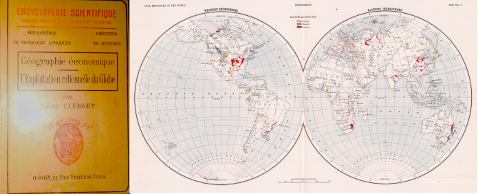"Understanding & Acting" conference
When the whites wanted to preserve the planet. A History of Geopower, 1865-1914

Lecture by Christophe Bonneuil, historian, research director at the CNRS and teacher at the École des Hautes Études en Sciences Sociales (EHESS). Christophe Bonneuil has been working on transformations in the relationships between the environment, knowledge and societies since the 19th century and has notably written (with Jean-Baptiste Fressoz), L'événement anthropocène : La Terre, l'histoire et nous, Seuil, Points Histoire, 2016.
He directs the collection "Anthropocène" published by Seuil on the socio-ecological and planetary stakes.

Abstract: What if our contemporary planetary "environmental consciousness" were not so new?
What if ignoring the environmental reflexivities of past societies would penalize us for contemplating the future of the current planetary upheavals?
For half a millennium, the definition of the Earth's wealth, balances and limits, of its "good use", sustainable and rational, has been a power issue. Rather than a narrative of progressive 'awareness' of the alterations caused to planet Earth, recent environmental history work has highlighted the antiquity - and historicity - of environmental reflexivities. As Europe extended its empire over the world, its religious, political, economic and scholarly elites forged discourses and knowledge of the "proper use" of the entire Earth. Just one example: from Christopher Columbus to the Count of Buffon, a large-scale theory of climate change helped to legitimize the project of European possession of America. After outlining the stakes of such a history of the constitution of the entire Earth as an object of knowledge and power, the paper will focus on a particular moment in this geopower, that of the "age of empires" from the end of the 19th century to the beginning of the 20th century.
More info
- C. Bonneuil & Jean-Baptiste Fressoz, L’événement anthropocène : La Terre, l’histoire et nous, Seuil, Points Histoire, 2016.
- C. Hamilton, C. Bonneuil & F. Gemenne, The Anthropocene and the Global Environmental Crisis: Rethinking Modernity in a new Epoch, Routledge (coll. « Environmental Humanities »), 2015, and specifically Chapter 2 on Anthropocene narratives.
See also
Brouillon créé le 29 March 2023 à 15h16
10 January 2023
(Français) La notion de sobriété renvoie à une distinction implicite entre désirs et besoins, la distinction entre...
More infoWhy is sobriety necessary, and the obstacles to its implementation?
26 November 2019
(Français) La notion de sobriété renvoie à une distinction implicite entre désirs et besoins, la distinction entre...
More info



